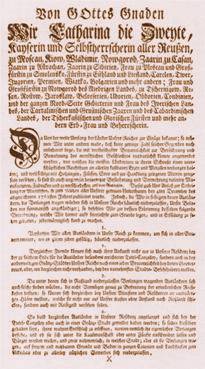![]()
![]()
The Russian Expansion under Alexander I (1801–1825)1
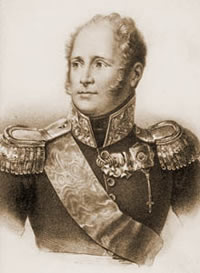
Alexander I
In 1801, after the assassination of Paul I, his son followed him on the throne as Alexander I (brother of Catherine Pavlovna, Queen of Württemberg), who had grown up under his Prussian grandmother, Catherine II’s, supervision and was educated in the spirit of Enlightenment2. After his accession to the throne he reformed the State apparatus in accordance with the principles of the Enlightened absolutism3.
In the field of home affairs he tried to promote intellectual education and to reduce the hard lot of the serfs. He abolished torture and corporal punishment, and prohibited the use of torture during interrogations. Exhibiting serfs for sale or offering them in the newspapers was forbidden in 1801.
Alexander's Domestic Policy
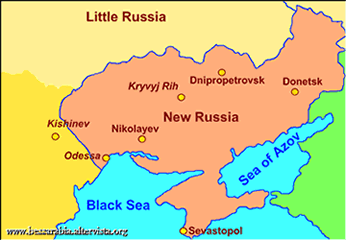
New Russia
On October 8, 1802, a short time after his accession to the throne, Alexander divided the great province of New Russia, created by his father Paul I, into the provinces of Ekaterinoslav, Taurida, Nikolaev (later Cherson) and drafted a plan for the development of the almost deserted border areas conquered from the Ottomans (Turks).
For this, he referred to the experience of his predecessors.
For the establishment of new colonies, areas should be divided near the harbors of Odessa and Theodosia. In Taurida the winegrowers should be settled, and in Molochna farmers experienced in gardening.
In 1803 Alexander I issued his first invitation manifest which granted the same privileges to those willing to emigrate as in Catherine's manifesto of 1763.
In the first half of the 19th Century, about 55,000 Germans settled as farmers and craftsmen in the colonies and cities of New Russia.
Many of the emigrants came from: Württemberg, Baden, Alsace4, Palatinate and Switzerland. However, the most emigrants came from Württemberg, which granted its citizens the unique right of departure5. The Germans often joined Dutch, French, Swedes and Italians.
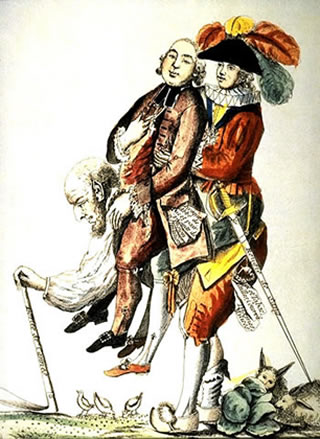
The Farmers, the 3rd Estate Bear the Burden
of the Other Two Estates.
The emigration reasons of the inhabitants from Württemberg were varied. In this first phase (1804-1810) there were mainly economic issues leading to emigration.
The initial enthusiasm of the inhabitants from Württemberg for the French Revolution (1789-1799) received a setback when, in 1796, when French troops ranged over the country like "swarms of hungry wolves."
People fled into the forests or took up arms to ward off the Marauders.
The many years of armed conflict, first with and then against Napoleon (1792-1802 French revolutionary wars, Napoleonic Wars from 1800 to 1814/15) had taken an enormous toll on human life, however it also had cost money and material.
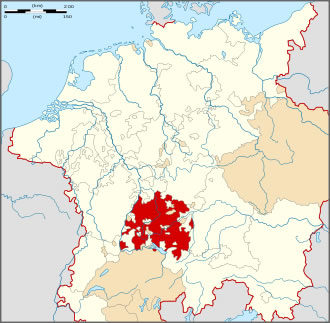
Swabian Circle of the Holy Roman Empire (in red)
According to the terms of the armistice of 1797, the States of the Swabian circle6 had to provide horses, grain and feed.
In 1798, when the War of the Second Coalition17 against France began, Württemberg was forced to participate in the cost of the war and to feed the Austrians in the country. But in 1799, the French came back and drained the country dry again.
The nearly continuous war efforts forced up the tax burdens and led in wartime to permanent special deliveries and seizures and in peacetime to the repayment of war debts and compensation payments to the victorious powers.
But also included in the reasons for emigration, were overpopulation and poverty caused by division of real estate8.
While the wealthy tried to preserve the last of their possessions, the poor wanted to improve their lot by emigration.
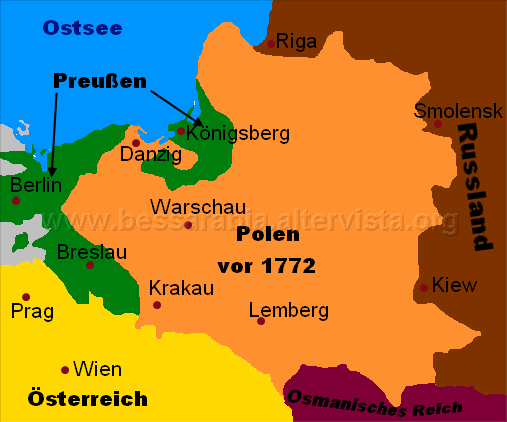
The Partition of Poland in 1772, 1793 and 1795
This raises the question, why did they emigrate to Russia if most emigrated to Prussian Poland around 1800? The special state benefits at that time were more positive in Russia than in Prussia.
Since Ivan theTerrible, there were special benefits for foreign merchants to live in a foreign country with their own customs.
Also, Peter the Great, was in Nemezkaja Sloboda first in the spring of 1690, and in 1702 guaranteed with his manifesto, religious freedom to emigrants from Germany which was renewed in 1735 by Czarina Anna Iwanowna and in 1751 by Elisabeth I and then by Catherine II in 1763 in her manifesto of invitation when 30,000 Germans were settled in the Volga area from 1763 to 1767.
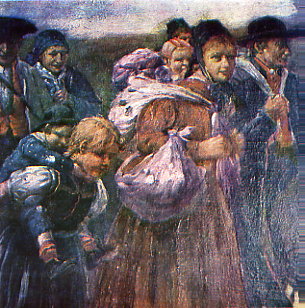
German colonists
Those who were willing to settle as a colonist in Russia were promised not only an inheritable piece of land for the youngest son (Minorat), the basic equipment for the settlement, and also tax exemption for the first 10 years, extensive self-government, exemption from military service, freedom of religion and the possibility to return in the motherland.
For such a magisterially governed country as the Russian Empire, in which the rural population lived largely in a state of serfdom and in which the Russian Orthodox Church was the dominant State Church, these were quite extensive privileges.
1 Thanks to S. Winkler for help with the English translation of this page
2 Enlightenment = Term used to describe an historical epoch in Europe in the 18th Century. The term enlightenment means enlightenment in the sense of the mind. In general we understand it as an extension of our mind. "Have courage to serve you of our own mind!" was the motto of the European enlightenment of Immanuel Kant who meant by this the inner liberation from patronage. The following views were determinant for the Enlightenment: rationalism and empiricism; criticism of Church and religious dogmatism; criticism of the State and social order; unconditional belief in progress; tolerance in society, politics and religion; cosmopolitanism; individualism; Deism (doctrine, according to which God has created the people and the world, but then, did not intervene anymore in the course of the world)
3 In the second half of the 18th Century, a special form of absolutism, called enlightened absolutism, developed through the close connection between the absolute reign of Princes and the ideas of the enlightenment. The influence of the enlightenment was reflected in the change of the legitimacy of rule. While classic absolutism was understood as reign 'by grace of God'; the representatives of enlightened absolutism justified their positions by their commitment to the well-being of their subjects. Frederick the Great of Prussia called himself the 'first servant' of his State. The purpose-rational reason of the dominion led to the recognition of a contractual relationship between monarch and subjects determined by mutual obligations.
Enlightened rule appeared also in the effort to reform the State. So the reforms of the father of Frederick the Great, Fredrick William I of Prussia, or those of Maria Theresia, the mother of Joseph II, were in the areas of administration, military, or finance and led to an adequate organization. However, the crucial reforms of the enlightened absolutism concerned such legal areas as the abolition of torture and restrictions on the death penalty.
The increased granting of religious tolerance was another feature of enlightened rule. In addition to the economic benefits brought by such reforms, it usually corresponded to the personal conviction of the rulers. The training of a bureaucracy, which could become a significant factor in the modernization of the States in the 19th century, was in connection with some self-commitment of the Princes in their official duties.
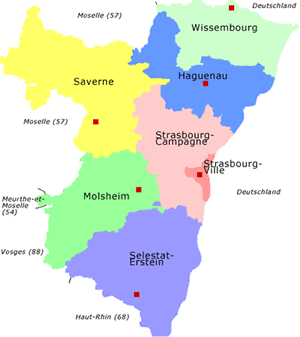 4 From 1798-1871 the region of Alsace was part of France. In the years 1803-1817, there were three emigration waves of Alsatians to South Russia. Most of them came from the districts of Wissembourg, Haguenau and Saverne in Bas-Rhin (Lower Rhine). These areas, during the years of the French revolution, suffered very much economically. During this time, around 40,000 people left their homeland and moved across the Rhine into Germany. Only in 1798 were they allowed back into Alsace, but they were landless and penniless. Always hopeful to have their own piece of land, many Alsatian peasants searched a new beginning in Russia.
4 From 1798-1871 the region of Alsace was part of France. In the years 1803-1817, there were three emigration waves of Alsatians to South Russia. Most of them came from the districts of Wissembourg, Haguenau and Saverne in Bas-Rhin (Lower Rhine). These areas, during the years of the French revolution, suffered very much economically. During this time, around 40,000 people left their homeland and moved across the Rhine into Germany. Only in 1798 were they allowed back into Alsace, but they were landless and penniless. Always hopeful to have their own piece of land, many Alsatian peasants searched a new beginning in Russia.
The first emigration wave began with the manifest of Alexander I. Already in 1803/04 many families moved to the areas near Odessa and were settled in the Liebental colonies or on the Crimea.
The second and largest emigration wave followed in the years 1808/09. This group together with colonists from the South Palatinate and the Duchy of Baden founded the Catholic colonies on the Kuchurhan and in the Beresan District.
The third wave followed after the fall of Napoleon in 1815 and the invasion of Alsace in 1817. Twenty-five families from Alsace emigrated to Russia. Social disgrace and the disastrous material position of most farmers’ (poor harvests in the years 1815-1817) forced many people to emigrate.
5 The domestic right of departure in the Prussian States was abrogated by the regulation of November 27, 1777; but reintroduced with the Edict of November 15, 1787 (paragraph 176).
In the Kingdom of Württemberg it was abrogated again in 1807 and restored by the Landständische (Landstände= body of representatives of various classes in medieval provincial politics) Constitution in article 56 on 15 March 1815. In addition the Constitution of the German Confederation from 1815 allowed specifically for emigration of the subjects of German princes and residents of the free cities, if another State wanted to take them as subjects (article 18).
In Württemberg, the right of departure was completely abrogated by the law of 19 November 1833.
6 Swabian Circle = one of the ten Imperial Circles of the Holy Roman Empire (1512-1806), comprised of the monasteries of Constance and Augsburg, the Princely abbeys Kempten and Ellwangen, 21 abbeys, the Duchy of Württemberg, the Margravate of Baden, the principalities of Hohenzollern, the Prince Damenstift (noble convent) Lindau, Buchau, numerous other secular Lords and 31 free cities (including Ulm).
7 Second War of Coalition = the aggressive policy or the strong advance of the French within the framework in the 'Napoleonic Wars" led to the three-year Coalition War (1799-1802) of European powers (Britain, Austria, Russia, the Ottoman Empire, Portugal, Naples, the Papal States, Austria, Electoral of Bavaria, Electoral of Mainz and Duchy of Württemberg) under the leadership of the Russian Tsar Paul I against the French Republic, which ended in 1800 with the defeat of Austria and in 1802 with the temporary peace with England (Treaty of Amiens).
8 Division of real estate = The possessions of a family, in particular the land, which was divided 'real' among the beneficiaries. This division took place at each inheritance, so that over time there were an increased the number of ‘mini’ plots. In agriculture the continued division of real estate led to a fragmentation of arable land in a variety of small fields, often in the form of narrow strips. In 'Old Württemberg' this division of real estate resulted in fields that were soon too small to feed a family and resulted, in part-time farmers in Württemberg who operated as craftsmen. At the same time the inherited estate secured a minimum maintenance, because you inherited not only a piece of land, but also a part of the parental home. However, there was often only single room where entire families crowded together.


